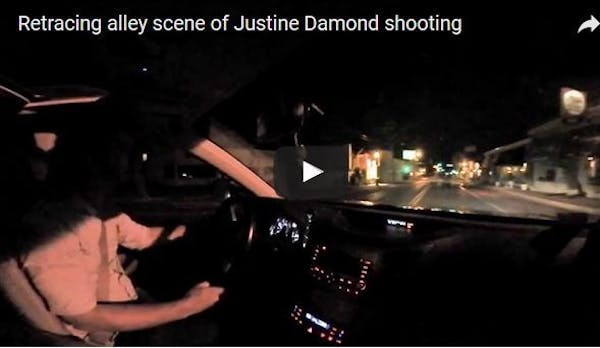Just past sunrise the morning after a Minneapolis police officer shot and killed Justine Ruszczyk Damond, more than a half-dozen state agents piled into the victim's house on Washburn Avenue, searching for blood, hair, guns, ammunition, knives, drugs or "writings" that would help them understand what happened.
Don Damond, the victim's fiancé, was still trying to get back to Minneapolis from out of town.
Investigators from the Minnesota Bureau of Criminal Apprehension (BCA) took nothing from the home, according to the warrant. The Damond family's attorney said the search was appropriate, but it has provoked anger in southwest Minneapolis.
"Why would you search someone's house if something happened in another place and they were killed?" said Jim Miller, who lives in nearby Linden Hills. "This didn't happen at her house."
The search was the second recent instance in Minnesota of investigators scouring the home of a person shot and killed by police. BCA agents received a warrant to search Philando Castile's home after he was killed by a police officer in Falcon Heights in 2016.
Agents did not search the home of Jamar Clark after he was shot and killed by Minneapolis police in 2015, said Jill Oliveira, a spokeswoman for the BCA.
The warrant for the Damond home was granted by District Judge Laurie Miller at 5:38 a.m. on July 16, the morning after the shooting, and state agents searched the home at 6:30 a.m. They wanted to give prosecutors the most complete picture possible, Oliveira said, and there could have been clues in the house.
"At the time, investigators were unsure of the events leading up to her death," Oliveira said. "As stated in the warrant, MPD officers involved in the incident were not providing information to investigators at that time."
Bob Bennett, the lawyer who represented the Castile family and is representing Don Damond, said he has no problem with the search of the Damond home, since Justine Damond's call to police about a possible assault nearby emanated from there.
"There's a more logical tie to a search warrant there," Bennett said. "If I was in charge of the investigation, I would have ordered it done."
The search of Castile's home, phone and social media accounts, Bennett said, had far less justification.
"I find it fairly repugnant in the Castile situation, and really not repugnant at all in Justine's case," Bennett said.
Warrants were also a point of contention for Larry Rogers, an attorney for Diamond Reynolds, Castile's girlfriend. Rogers repeatedly protested investigators' scrutiny of Castile's and Reynolds' phones and called warrants to search them "fishing expeditions" that invaded the privacy of Castile's family and left them "victimized and scrutinized."
Don Damond was not available to comment Monday, but some of his neighbors said they suspected investigators of looking for a way to discredit the victim.
"People are absolutely outraged about it," said Council Member Linea Palmisano, who represents southwest Minneapolis.
Palmisano's understanding, she said, is that investigators want to rule out alternative explanations for Damond's death, however far-fetched they might be. But she acknowledged a lingering sense in the neighborhood that BCA agents may have been looking to incriminate Damond.
What was BCA looking for?
About 160 people attended a policing forum that Palmisano hosted at Lake Harriet Methodist Church on Aug. 2, and when they broke into groups to write questions on big sheets of paper taped to pillars, the warrant came up repeatedly.
"They were concerned about bodily fluids, about illegal drugs. These were very strange things to even be looking for," said Miller, who serves on the Linden Hills neighborhood board. "If they had found something, which they didn't, they would have used that as an excuse for the actions of police."
Michael Quinn, a retired Minneapolis police sergeant and CEO of the International Ethics and Leadership Training Bureau, said it's not standard practice for police to search the home of the victim.
"I'm not sure why they decided to get a search warrant for her house. That struck me as odd also," said Quinn, who lives a couple of blocks from the scene of the shooting.
Perhaps Damond had recorded something or took notes that would tell investigators what she heard outside in the alley, Quinn said, but that's the only reason he can think of for the search warrant. He does not share the suspicion that police were looking to discredit Damond.
"I think it's paranoia to say that they're in there looking for a reason to excuse the shooting," Quinn said.

Souhan: Wolves fans made Game 1 special. Now bring on Game 2.

Kao Kalia Yang, Edel Rodriguez and others bring us gorgeous new picture books
Tip sparks new search for Blaine woman who went missing 30 years ago

